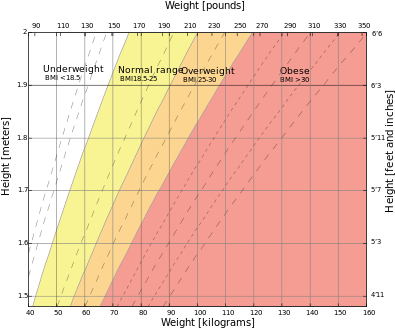BMI Calculator: How Healthy Is Your Weight?
Notes from Dr. Norman Blumenstock Typically, people with higher BMIs have a greater likelihood of developing conditions such as heart disease, high blood pressure, sleep apnea, and type 2 diabetes. But many factors — including your family history, eating habits and activity level — also influence your overall health. http://www.aarp.org/health/fitness/info-05-2010/bmi_calculator.html?cmp=NLC-MBA-090814&e2token=Ymx1bWVuc3RvY0B5YWhvby5jb20%3D Calculate your BMI. …
TWO SIGNIFICANT INDICATORS OF SLEEP APNEA- BMI and NECK CIRCUMFERENCE. Calculate them here:
Notes from Dr. Norman Blumenstock:Calculate your Sleep Apnea risks factors here: The Body Mass Index (BMI) appraisal is one of the most widely used tools to measure healthy body weight. This ratio of height to weight will help assess whether you are underweight, normal weight or overweight. The higher the BMI, the greater the risk of some diseases, including: Sleep Apnea, Stroke, High blood pressure, Coronary artery disease, Osteoarthritis, Some cancers, Diabetes type 2. Sleep Apnea awareness is “contagious”. As more and more people learn about SA, doctors are driven to get training and certification to be able to discover and treat this disease. Less than …
Sleep lessens effect of genes on weight
Study compares the BMIs of twins By Nanci Hellmich USA TODAY Sleeping more may help you fight a genetic predisposition to gain weight, a new study says. “The less sleep you get, the more your genes contribute to how much you weigh. The more sleep you get, the less your genes determine how much you weigh,” says lead author Nathaniel Watson, a neurologist and co-director of the University of Washington Medicine Sleep Center in Seattle. Research has shown the connection between sleep and weight before, but this study looks at the role of genetics. Watson and his colleagues analyzed self-reported …
Lack of Sleep May Increase Calorie Consumption
If people don’t get enough sleep, they may also eat too much—and thus be more likely to become obese. That is the finding of researchers who presented their study at the American Heart Association’s Epidemiology and Prevention/Nutrition, Physical Activity and Metabolism 2012 Scientific Sessions.“We tested whether lack of sleep altered the levels of the hormones leptin and ghrelin, increased the amount of food people ate, and affected energy burned through activity,” said Virend Somers, MD, PhD, study author and professor of medicine and cardiovascular disease at the Mayo Clinic, Rochester, Minn.The researchers studied 17 normal, healthy young men and women …






